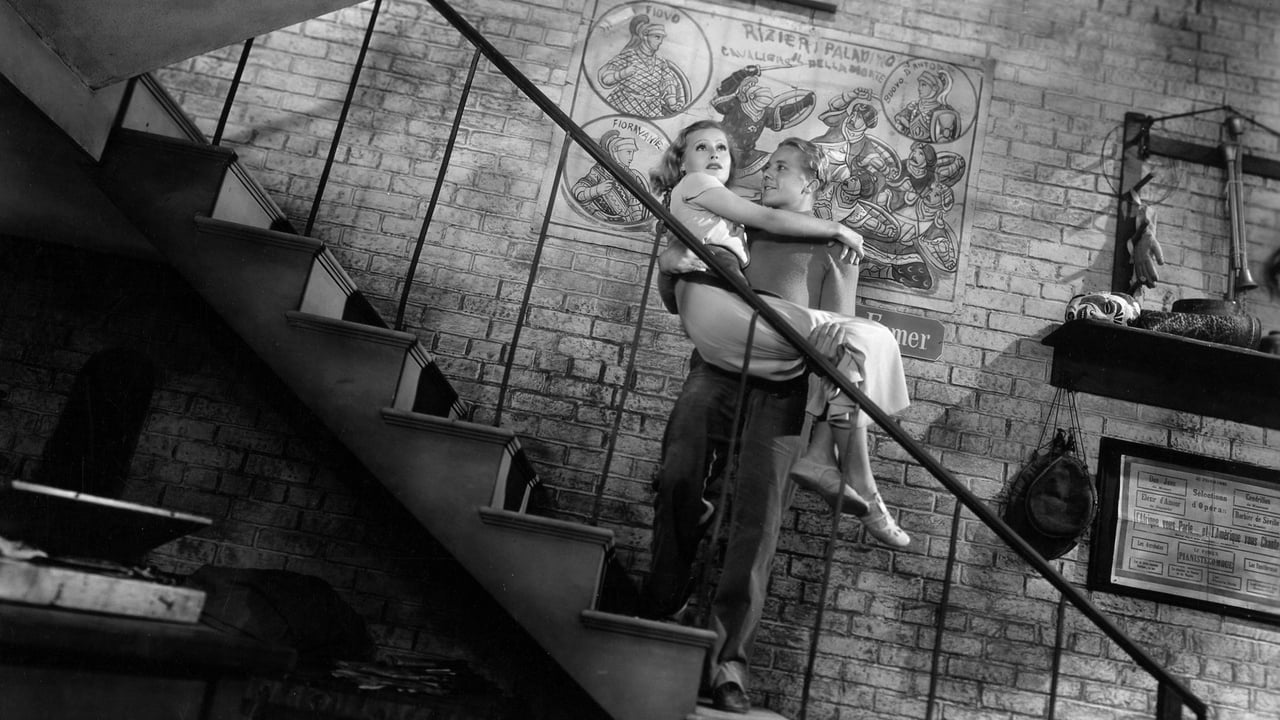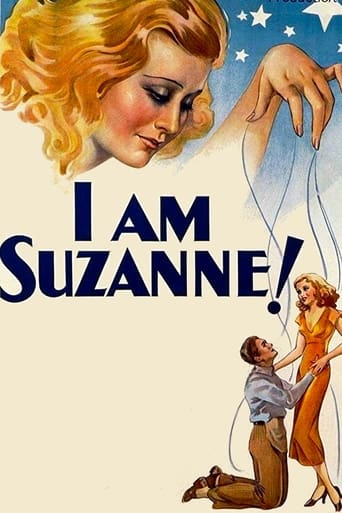CheerupSilver
Very Cool!!!
Ogosmith
Each character in this movie — down to the smallest one — is an individual rather than a type, prone to spontaneous changes of mood and sometimes amusing outbursts of pettiness or ill humor.
Hattie
I didn’t really have many expectations going into the movie (good or bad), but I actually really enjoyed it. I really liked the characters and the banter between them.
mcannady1
A friend just sent me a great copy of this film. It is black and white, but primarily sepia-colored when the stage performances are shown.From the first I felt an empathy for poor Suzanne who practiced for hours and was forced by her manager (well-played by Leslie Banks) to isolate from fans or friends. Her helper, "Mama", was in sympathy, but was out for what she could get. She tirelessly keeps Suzanne practicing her ballet steps.When Suzanne meets Tony the puppeteer, her manager throws him out, as he fears she will leave the act. He is jealous in a personal sense as well. Even when Tony explains he wants to sketch a puppet of Suzanne, The Baron gets angry. Though he never appreciates her fine singing voice and her lovely stage dancing, he is quick to pocket a lot of Suzanne's earnings. He also uses psychology on Suzanne to get her to marry him. Hinting that she will be without her act if she does not, Suzanne is afraid to give up her dancing and singing. She almost tearfully asks "the Baron" to marry her and it is arranged.When Suzanne (beautifully portrayed by Lillian Harvey) sang and did her stage performances, I felt pleasantly surprised by the lovely intertwining harmonies supplied by the puppeteers, who had their people sing and dance with lovely precision. The singing voices are reminiscent of the haunting harmonies of the voices in Merrie Melodies cartoons of the 30s and also films I love of the early 30s.When Suzanne is doing her act "flying through the air" from the audience to the stage, Tony begs her not to marry the Baron. Thus, she recognizes feelings for him which cause her to miss-step. As she falls and ends up in hospital, Suzanne is encouraged by the doctor and Tony daily. Tony helps with her exercises and Suzanne is recovering. She does not wish to marry the Baron and tells him so.I have not seen many puppet performances, but these are superb! The dancers are perfect replicas of Tony and Suzanne and dance beautifully in time to the music. I do like The Puppet People and a film with Lionel Barrymore where he wreaks vengeance on people, shrinking them to doll size. These are skillfully done, but show the real people in close-ups as well as the puppets.In I Am Suzanne, we see more close-ups of the puppets. AS reviewers have already pointed out, Suzanne is confused about Tony's feelings when he proposes to her through the life-like puppet he has made of himself (and her). Later he explains that she, as a star, was an ideal to him. He never thought he would be close enough to propose marriage to her.I will not spoil the denouement of the film for others. I think it is time well spent.
MartinHafer
Tony (Gene Raymond) is a poor but likable puppeteer. While his marionettes are charming, his audience is tiny. One day he sees the vivacious Suzanne (Lillian Harvey) performing on stage and he's enchanted...so enchanted that he wants to design a puppet after her. However, her manager won't allow Tony or anyone to get close to his protégé and this is because he carefully manipulates her and degrades her talent in order to keep her believing she needs him to be a success! This guy, the Baron (Leslie Banks), is a real jerk and when he asks her to marry him, you assume it's not out of love but more a business proposition to keep her under his wing. Tony is convinced the Baron doesn't love Suzanne and tells her...at which time her concentration is disrupted and she takes a terrible fall during the show.For the next several months, Tony takes care of Suzanne and nurses her back to health...even though it appears she'll never dance again. Slowly, very slowly, she begins to recover--during which time she learns puppetry from Tony. Sadly, during all this time the Baron never sees her. After all, she's no longer of use to him. But when he learns she's recovering, this manipulative jerk springs into action...and does his best to sow seeds of discord in the blossoming relationship between Suzanne and Tony. Tony himself doesn't help it any when he starts to take it for granted that Suzanne no longer wants a life on the stage but with him and his marionettes. What's next?This is a very charming picture and your heart aches for poor Suzanne. After all, she never is allowed by anyone to choose what she wants. Plus, she's so neglected and mistreated by the Baron-- and this is a sharp contrast to the amazing and very sweet marionette shows throughout the film. My only quibble is some of these sequences go on a bit too long. Still, it's an unusual film and somewhat reminiscent of both "Svengali" and "Lili". Well worth seeing...and oddly, a very pink movie since someone thought it was a good idea to tint this black & white film!
GManfred
You have probably never seen a movie like "I Am Suzanne!" Read the summary and you will get a feel for it, and it will save me from trying to explain why this is such a rewarding, heartwarming film - and those are adjectives I seldom use. I just wonder where the idea came for this picture - 'original' is hardly the word to describe it.I think it is basically a love story and would be rated 'G' today, as it would have great appeal to children; think "Hans Christian Andersen" (1953) but minus puppets, and that would approximate the depth of the plot. The principals are childlike, and behave like children would think adults behave. Bland 30's leading man Gene Raymond is the puppeteer who thinks his marionettes are almost real, and Lilian Harvey is an unhappy dancer. They fall in love, although she is a greater success than he; few come to see his puppet shows and she is a celebrity.Special mention should be made of the Yale Puppeteers, the real stars of the piece. When they are on-camera they steal the show, as much as possible for dolls on strings. So good are the Puppeteers that the dolls come to life in the several different set pieces they are in. I always thought puppeteers just stood above the puppet stage, but here they have intricate walkways to follow the movements of the puppets. The whole novel effect of the picture is fascinating and might have been better with a replacement for Raymond. Also if Fox spent a few more dollars on the production.This one is worth it if you can find it. It comes in one-strip color but my copy was slightly blurry. Find a good movie pirate and buy it.
F Gwynplaine MacIntyre
'I Am Suzanne' is an astonishing film, one of the most original movies I've ever seen ... and yet it reminds me of several others. Director Rowland V. Lee and his co-scenarist Edwin Justus Mayer are both severely underrated; their careers are overdue for reappraisal, and this movie is a good place to start.'I Am Suzanne' was apparently meant as a star vehicle for Lillian Harvey, an actress who seems highly artificial. Her accent is slightly too cut-glass, her performance (in this film, at least) too mannered. She is blonde and pretty, but not quite beautiful: her eyebrows have been plucked to within a millimetre of their lives, and her nose is slightly bulbous. The best performance in the film is by that excellent and underrated character actor Leslie Banks: he manages to invest some subtlety into a highly theatrical role which gives him legitimate reasons to chew the scenery.'I Am Suzanne' has strong overtones of the later and better-known 'Lili', Edgar Ulmer's 'Bluebeard', 'Pinocchio', 'Laugh Clown Laugh', and also the weird semi-fantasy 'Zoo in Budapest' (starring Gene Raymond in a role similar to the one he plays here). The dream sequence in this movie reminds me of the trial scene in 'Alice in Wonderland' and also of 'Attack of the Puppet People' ... specifically, that science-fiction film's bizarre scene in which a woman, shrunk to doll size, is forced to co-star opposite a marionette in a puppet-show performance of 'Dr Jekyll and Mr Hyde'.CONTAINS SPOILERS. Suzanne is a beautiful young orphan who dances for coins in the street, and who is dominated by her Svengali-like guardian, who calls himself the Baron, It's clear that the Baron's interest in Suzanne is entirely exploitative: he makes money off her, and he lusts for her. The only implausible thing about this arrangement is that he hasn't tried to rape her yet.Handsome young Tony (Raymond) is a puppet-master who becomes so enamoured of Suzanne's beauty that he asks her consent to make a marionette in her likeness, so that 'Suzanne' (the puppet, not the woman) can star in Tony's shows. There are several very impressive set-pieces, in which the marionettes perform enjoyable routines. The only flaw in these delightful sequences is that Tony is ostensibly manipulating the marionettes, yet it's clear that actor Gene Raymond is being 'doubled' by some experienced puppeteers. Comedic actress Florence Desmond, well known in England at this time for her deft impersonations of film actresses and celebrities, provides the voices for several of Tony's marionettes.The Baron hopes to make more money off Suzanne: the woman, not the puppet... although Suzanne symbolically *is* a puppet under his domination: it's this sort of layered symbolism that makes this story so fascinating. The Baron bullies Suzanne into performing a tightrope act. She falls and injures herself. Now her dancing days are over, and she might not even walk again.Lillian Harvey convincingly depicts Suzanne's confusion and immaturity, even though the actress is slightly too old for this 'Lill'-like role. She feels attracted to Tony ... yet she also feels jealousy towards the puppet-version of herself, as Tony seems to be more interested in the marionette Suzanne than in the real version. Eventually, she shoots the puppet version of herself! This prompts the film's most remarkable set piece, a nightmare sequence that reminded me of 'Puppet People'.In her nightmare, Suzanne dreams that she has been put on trial for murder: the murder of her puppet-self! She finds herself in the dock at a Kafka-like trial, with a puppet jury, presided over by the King and Queen of Puppet Land! It would have been easy for this sequence to slide into absurdity, and I had a whole flotilla of wisecracks ready for the King and Queen of Puppet Land: Do they run a puppet government? Can they pull a few strings? If the marionettes find Suzanne guilty of murder, will they string her up? Remarkably, this film expertly maintains its balance between fantasy and reality, between imagination and delusion.Is it possible to rate a movie 11 points out of 10? No? Then I'll have to rate 'I Am Suzanne' a lowly 10 points out of 10. Why didn't Lee and Mayer follow this triumph with another great film?

